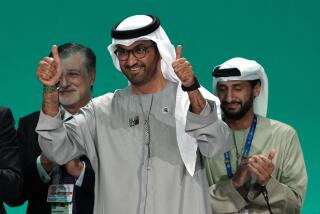Zimbabwe accord serves as litmus test
- Share via
JOHANNESBURG, SOUTH AFRICA — Is this what they meant when they called it a power-sharing agreement? When Zimbabwe’s new “unity” government is sworn in this month, it will have two police ministers sitting in the same building with the same job and the same powers.
Analysts warn that the deal, reached a tortuous 10 months after opposition leader Morgan Tsvangirai stunned President Robert Mugabe in elections last year, is so riddled with those kinds of contradictions and nebulous boundaries that it may prove unworkable.
But should it fail, the deal will not only drag Zimbabwe further down. The accord, brokered by regional leaders in the Southern African Development Community, has become a litmus test for “African solutions for African problems,” the idea that indigenous solutions work better in Africa than those imposed by the West.
Critics argue that African-brokered power-sharing deals such as those signed after Kenya’s violent 2007 elections and Zimbabwe’s disputed vote last year have set a precedent that leaders in Africa can cling to power when voted out, just by refusing to leave office.
They say bodies such as SADC and the African Union have done little to protect democracy or stop violence and human rights abuses, tending to side with incumbent leaders such as the long-ruling Mugabe, whose regime has been accused of unleashing violence to stay in power and denying food to opposition villagers.
Tony Reeler, analyst with the independent Research and Advocacy Unit in the Zimbabwean capital, Harare, called last month’s agreement “another SADC railroading job.”
“With SADC, it’s unity at all costs,” he said. “I think that what’s tending to emerge is that African solutions tend to be partisan, one way or another, and that’s what we’re seeing here.
“I think Zimbabwe is testing African solutions for African problems very harshly.”
Mugabe’s government blames the West’s sanctions on regime officials for the country’s problems and has accused the opposition of dragging its feet.
“It has been a long, frustrating, erratic, bumpy and quarrelsome journey characterized by animosities, disagreements, mutual dislikes, name-calling, demonizations, vilification of each other’s policies and leaderships,” said Patrick Chinamasa, the minister for justice, legal and parliamentary affairs, who was one of Mugabe’s representatives in negotiations on the deal. Speaking in parliament, he continued, “But notwithstanding these negatives, what is important and significant is that we have managed to reach this far, and for that, we forever remain eternally grateful to our people for their resilience, understanding and support.”
Botswana, a member of SADC, has been the most critical voice inside the group. That nation’s foreign minister, Phandu Skelemani, said the group had let Zimbabweans down.
“As we have said before, we at SADC have failed the people of Zimbabwe,” he said in an interview with Zimbabwean radio journalist Violet Gonda before last month’s SADC meeting on Zimbabwe. “We have simply failed to tell the leadership, the political leadership in Zimbabwe, that what they are doing is wrong, it is undemocratic, and that they ought to respect the people and do everything with the people as the priority.”
Skelemani said it was patently ridiculous to have two ministers in charge of police -- whose powers Mugabe has abused in the past.
“How can that function?” he said. “Even in theory, I think it’s silly.”
Critics argue that most of the political leaders behind the “African solutions for African problems” compromises have deeply flawed democratic records.
Independent political analyst John Makumbe of the University of Zimbabwe said too many leaders in the regional group felt obliged to protect Mugabe because of his history as a liberation fighter.
“That’s the kind of problem we have in African countries: Liberation movements in southern Africa are really allergic to handing over power to civilians even after democratic elections. There’s not a liberation movement in southern Africa which has actually handed over power to a non-liberation party.”
Richard Cornwell, security analyst with the Institute for Security Studies in South Africa, said, “If liberation leaders are to start questioning the legitimacy of a revolutionary liberation regime, then they draw their own legitimacy into question.”
He said that with Mugabe still clearly in charge, the deal would be doomed.
“SADC appears not to have taken into consideration who is going to get Zimbabwe out of the mire. External funds are going to do that, and there’s no way the international community will buy in with Mugabe at the helm,” he said.
In Africa, there’s a tacit expectation that although the solutions may come from within, the financing comes from the international community.
South Africa and the African Union have called for an end to Western sanctions targeting Mugabe and an elite group of cronies. Europe and the United States say they will not support the deal financially without evidence of substantial political and economic reform.
Underscoring the African sensitivity to the fact that Western purse strings can make or break the deal, Arthur Mutambara, head of a small Zimbabwean opposition splinter group that is party to the agreement, said recently that the West should “shut up” and put up aid to rebuild the country.
“It’s not for Britain or America to judge our agreement,” he said at the World Economic Forum that concluded last weekend in Davos, Switzerland. “Your job as America or Britain is to support what we try to do. All the skeptics must now shut up and support what Zimbabweans want.”
--
More to Read
Sign up for Essential California
The most important California stories and recommendations in your inbox every morning.
You may occasionally receive promotional content from the Los Angeles Times.










